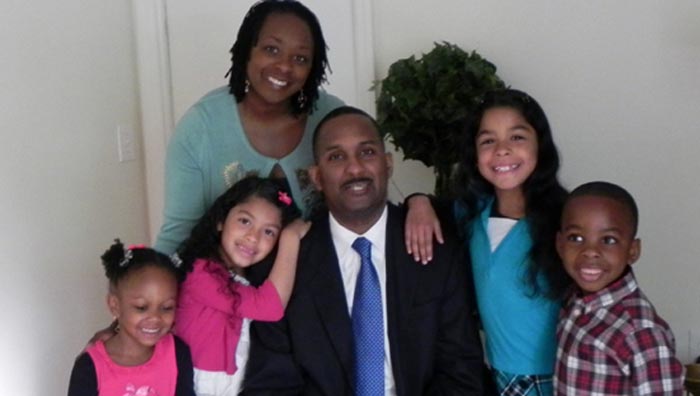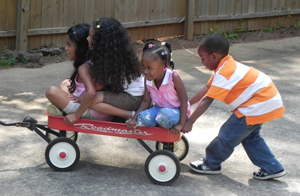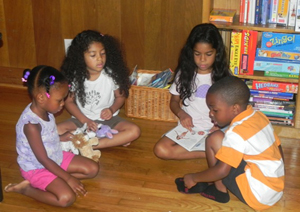
We have adopted four children, three girls and one boy. Our first two girls came to live with us in 2007, and the other two came to live with us in 2012. In 2007, we both worked outside the home. We enrolled our children in the best daycares that we could afford. Over the course of eighteen months, we moved our children to three different daycares. These were four and five star daycares, and in our visits, everything looked fine, but the more they attended daycare, the worse they got academically and socially. We also began to see changes in their speech and behavior that we knew they picked up from their time spent in daycare. They were exposed to things on television and language that we would never expose them to, and we realized that our children were spending more of their waking hours in daycare than they were with us. This problem was compounded by the fact that we had adopted our children, so they were adjusting to two new environments. We really did not want our children being exposed to two sets of standards.
In December 2008, I (Tanya) had foot surgery, and while I was home recovering, I had the opportunity to spend all day with our daughters and work with them at home. I loved it, and in 2009, I was introduced to the idea of homeschooling. We joined a local homeschool support group and became actively involved in the homeschool community. By the time our oldest daughter was five in the spring of 2009, she was reading between the first and second grade level. Her younger sister was only slightly behind her, reading on a solid first grade level. They were performing similarly in math as well.
 In April 2012, we started the process of adopting our son, age five and now our new youngest daughter, age three. When they came to live with us during the adoption process, we immersed them in our homeschool lifestyle as well. We discovered after a few days that our son could not spell his name and his reading skills were behind where we thought they should be for his age. His sister didn’t know any of her colors or alphabets. After a few weeks, we realized that our son might possibly have a learning disability. We did some research and began working with him one-on-one to help him work through his learning issues. Our other two daughters were pretty independent by this point, so we had the time to focus on him. It took approximately six months, but this young man can now read at or above grade level and can successfully sound out words that he has never seen. He has begun to conquer his challenges, but we were able to do this, because we homeschooled him. No teacher or tutor in the traditional public or private school setting would have taken the time reach this young man. If he got an answer wrong, he would have sat quietly and not said another word. He would not be disruptive, but he would not retain anything that was being taught for the rest of the day. He would have been a statistic. His sister, now four, is coming along as well.
In April 2012, we started the process of adopting our son, age five and now our new youngest daughter, age three. When they came to live with us during the adoption process, we immersed them in our homeschool lifestyle as well. We discovered after a few days that our son could not spell his name and his reading skills were behind where we thought they should be for his age. His sister didn’t know any of her colors or alphabets. After a few weeks, we realized that our son might possibly have a learning disability. We did some research and began working with him one-on-one to help him work through his learning issues. Our other two daughters were pretty independent by this point, so we had the time to focus on him. It took approximately six months, but this young man can now read at or above grade level and can successfully sound out words that he has never seen. He has begun to conquer his challenges, but we were able to do this, because we homeschooled him. No teacher or tutor in the traditional public or private school setting would have taken the time reach this young man. If he got an answer wrong, he would have sat quietly and not said another word. He would not be disruptive, but he would not retain anything that was being taught for the rest of the day. He would have been a statistic. His sister, now four, is coming along as well.
In our experience, homeschooling our adopted children resulted in several benefits. First, homeschooling allowed time for our children to become bonded to at least one parent, my wife, and it totally immersed them in the household full-time. Bonding is very important for any child, but it is often particularly difficult for adoptive children to bond with their adoptive families. Every adopted child has been taken from their birth family, and oftentimes, with little or no notice. They may have lived in one or more foster homes, and each time they are moved, they experience the loss of yet another family, another home, another familiar environment. By homeschooling our children, it increased their ability to depend on my wife because she was home all of the time, and if she went somewhere, they went with her. Homeschooling enabled our daughters to develop an extremely close and loving relationship with their mother.
We really saw the benefits of homeschooling when our second two children came to live with us in 2012. Our first two daughters came to live with us when they were one and two years old. While our son and youngest daughter are younger than our first two daughters, our son was five and our youngest  daughter was three when they first came to live with us. They carried a lot more emotional baggage and scars than our first two daughters because they were older and actually knew and remembered their birth parents. It took several months before our son really bonded into our family, and it took close to a year for his younger sister to bond to our family. We don’t know how we could have achieved the results we have so far if we had not homeschooled them from the beginning. Part of our homeschool lifestyle was letting them know that they were now a part of our family, no one was going to take them away again, and we were not going to change our minds about keeping them. This message had to be repeated over and over again!
daughter was three when they first came to live with us. They carried a lot more emotional baggage and scars than our first two daughters because they were older and actually knew and remembered their birth parents. It took several months before our son really bonded into our family, and it took close to a year for his younger sister to bond to our family. We don’t know how we could have achieved the results we have so far if we had not homeschooled them from the beginning. Part of our homeschool lifestyle was letting them know that they were now a part of our family, no one was going to take them away again, and we were not going to change our minds about keeping them. This message had to be repeated over and over again!
Second, homeschooling our children helped them adjust to our home much easier. When we sent our first two daughters to daycare almost immediately after we adopted them, they were subject to two different environments, and they had to learn to navigate each one at the same time. By homeschooling them, they were able to focus on learning the rules of their new home and not be confused by two different sets of standards.
Third, one of the benefits of homeschooling that we experienced, particularly with our second two children, was academic. Children who have been abused and/or neglected and ripped from their birth families generally are not performing at grade level in school. In fact, it is not uncommon for them to be developmentally delayed because of neglect or abuse. Homeschooling our son and youngest daughter allowed them to learn at their own pace in a loving and supportive environment. Our son had some very serious challenges in learning to read. Homeschooling allowed us to work with him one-on-one and give him the time and attention he needed. Our oldest two daughters supported, encouraged and assisted them as well. They would not likely have experienced such a supportive environment in daycare or public school.
In sum, homeschooling has helped us to love and nurture our children, promote their emotional development and help them to excel academically. It has been our experience that homeschooling our adopted children has helped them cope with their previous losses and given them the comfort of knowing that they are in a safe and secure environment that will last forever.



